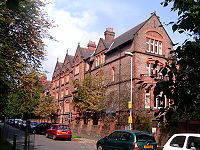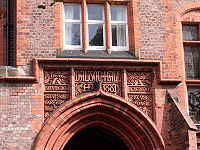
Dalton-Ellis Hall
Encyclopedia


University of Manchester
The University of Manchester is a public research university located in Manchester, United Kingdom. It is a "red brick" university and a member of the Russell Group of research-intensive British universities and the N8 Group...
, Manchester
Manchester
Manchester is a city and metropolitan borough in Greater Manchester, England. According to the Office for National Statistics, the 2010 mid-year population estimate for Manchester was 498,800. Manchester lies within one of the UK's largest metropolitan areas, the metropolitan county of Greater...
, England
England
England is a country that is part of the United Kingdom. It shares land borders with Scotland to the north and Wales to the west; the Irish Sea is to the north west, the Celtic Sea to the south west, with the North Sea to the east and the English Channel to the south separating it from continental...
. It is situated in the south of the city on Conyngham Road in Victoria Park
Victoria Park, Manchester
Victoria Park is an suburban area of Manchester, England. Victoria Park lies approximately 3 kilometres south of Manchester city centre, between Rusholme and Longsight.It is east of Wilmslow Road and west of Anson Road.-History and description:...
, next to St Chrysostom's Church
St Chrysostom's Church
Saint Chrysostom's Church is the Church of England parish church of Victoria Park, Manchester, England. The patron saint of the church is St John Chrysostom and the church belongs to the Anglo-Catholic tradition. St Chrysostom's, Manchester is one of three churches dedicated in honour of St John...
. It is close to Wilmslow Road in Rusholme
Rusholme
-Etymology:Rusholme, unlike other areas of Manchester which have '-holme' in the place name is not a true '-holme'. Its name came from ryscum, which is the dative plural of Old English rysc "rush": "[at the] rushes"...
. Dalton-Ellis has 279 male and female residents in catered accommodation. The hall admits both undergraduate and postgraduate students, most are undergraduate first years.
The hall comprises several named blocks built at various stages throughout its history. These include the Grade II listed Main Hall, the first purpose-built hall of residence in England
England
England is a country that is part of the United Kingdom. It shares land borders with Scotland to the north and Wales to the west; the Irish Sea is to the north west, the Celtic Sea to the south west, with the North Sea to the east and the English Channel to the south separating it from continental...
, opened in 1882, the Nield Wing extension to Main Hall, Fiddes, Graham, Ewings, and the most recent Sutherland, built in 1994. Dalton-Ellis has a second Grade II listed block, Eaglesfield, which is not currently in use. Sunnyside houses the Hall's library and music rooms. The hall has facilities including a squash court, tennis courts, croquet lawn, and and a bar. There is also a computer cluster and a reading room. The hall also has a rich history of sporting success, with the hall fielding rugby, hockey, netball, cricket, football and croquet teams.
History
Dalton-Ellis Hall itself is a relatively new hall, being a product of the merger of Dalton Hall and Ellis Llwyd Jones Hall in 1987. However, the history of the two separate halls goes back to the nineteenth century.Dalton Hall
Dalton Hall was founded by the Quakers 1876 as accommodation for students from a Quaker background attending Owens College, the forerunner to the University of Manchester. It was named after John DaltonJohn Dalton
John Dalton FRS was an English chemist, meteorologist and physicist. He is best known for his pioneering work in the development of modern atomic theory, and his research into colour blindness .-Early life:John Dalton was born into a Quaker family at Eaglesfield, near Cockermouth, Cumberland,...
, a scientist and Quaker in the city. At the time Owens College was one of only two institutions in the country to admit dissenters
English Dissenters
English Dissenters were Christians who separated from the Church of England in the 16th, 17th and 18th centuries.They originally agitated for a wide reaching Protestant Reformation of the Established Church, and triumphed briefly under Oliver Cromwell....
. The hall moved to the building currently used as Dalton-Ellis's Main Hall in 1882. The building, like the neighbouring St Chrysostom's Church was designed by George T Redmayne. In 1892 the large Victorian
Victorian architecture
The term Victorian architecture refers collectively to several architectural styles employed predominantly during the middle and late 19th century. The period that it indicates may slightly overlap the actual reign, 20 June 1837 – 22 January 1901, of Queen Victoria. This represents the British and...
house now known as Eaglesfield was bought to increase the hall's capacity. In the early years of the twentieth century the capacity was increased again with the addition of the Nield Wing extension to Main Hall, which contained more rooms and a Junior Common Room. Dalton Hall became a university hall of residence in 1958, adopting its current motto, 'trenter percenter'. Although the original intention was to admit both men and women, once the university started to admit women, this was later dropped and Dalton Hall remained a male only hall until the merger with Ellis Llywd Jones Hall in 1987.
Ellis Llwyd Jones Hall
Ellis Llwyd Jones Hall was founded in 1919, and throughout its existence was a female only hall. The hall was originally located in Old TraffordOld Trafford, Manchester
Old Trafford is in Greater Manchester, England, which lies south-west of Manchester. The crossroads sites of two old toll gates roughly delineate the borders of the area: Brooks's Bar to the east and Trafford Bar to the west....
, but moved brick by brick to Victoria Park in 1981. The hall was named after Ellis Llwyd Jones, the son of Sir James Jones who donated the hall to the university in memory of his son.
Further reading
- Sutherland, George Arthur (1963) Dalton Hall; a Quaker Venture. London: Bannisdale Press

